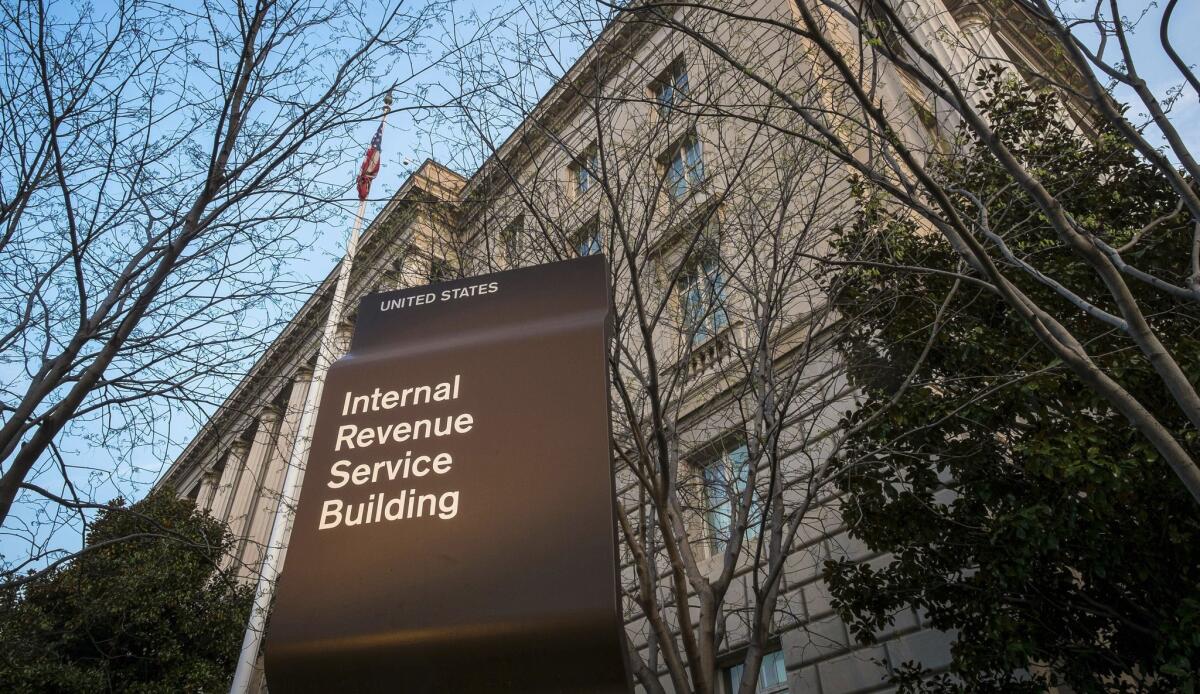Column: Republicans love to hate the IRS, but it’s a model of efficiency

- Share via
As you labor over your tax returns this month, spare a moment of sympathy for the least-loved agency in the federal government: the Internal Revenue Service.
Believe it or not, the IRS is becoming something of a model of efficiency among Washington’s bureaucracies. It collects more taxes every year than ever before, at lower cost per dollar collected than anytime since 1980. It does fewer face-to-face audits, too; most of its enforcement is done by checking electronic data and sending out letters. By the end of this year, its payroll will be about 14% smaller than five years ago, shortened by about 13,000 people. Its technologists have proposed new enforcement projects that would collect $8 to $13 for every dollar spent.
“That’s a return on investment that private businesses would kill for,” notes John Hudak, who studies the management of federal bureaucracies for the Brookings Institution.
And yet the IRS is a whipping boy for Republicans in Congress. They’ve cut the agency’s budget every year for four years. They’ve told the IRS to produce more — more service to taxpayers, more enforcement against tax cheats — but refused to pay for the added work.
The IRS is the agency conservatives love to hate. Sen. Ted Cruz (R-Texas), who’s running for the GOP presidential nomination, gets some of his loudest cheers on the campaign trail when he says he has a simple approach to tax reform: “Abolish the IRS.” Aides say Cruz would replace the agency with a tax collection division in the Treasury Department. (Treasury already has a tax collection division. It’s called the IRS.)
Republicans have at least one legitimate point of contention with the agency: the 2013 scandal over its targeting of tea party groups seeking tax-exempt status. Because of that flap — which investigations traced to mid-level incompetence, not White House scheming — the IRS still hasn’t clarified its rules for groups that engage in both political activity and “social welfare.”
But GOP critics don’t restrict their protests to that one incident. They’re still complaining about the IRS’ infamous $4-million management conference in Las Vegas, an excess that happened five years and three commissioners ago. And they’re still complaining that the IRS spends money to enforce President Obama’s healthcare plan, even though the IRS is merely doing what the law requires.
Meanwhile, the GOP continues to turn down the agency’s requests for more funding, even though more spending would produce much more revenue.
“We deliberately lowered the IRS’ funding to a level that will make the IRS think twice about what you are doing and why you are doing it, because you don’t have a single dime to spare on anything frivolous,” explained Rep. Ander Crenshaw (R-Fla.), the chairman of the House Appropriations subcommittee that oversees the IRS.
“It’s a mystery to me what they think they’re accomplishing by this,” IRS Commissioner John Koskinen, a former corporate CEO, told me. “This is penny wise and pound foolish…. I spent 20 years doing turnarounds, and I never met anybody who said, ‘Let’s starve the revenue producing area of our operation.’”
Actually, it’s not as mystifying as Koskinen pretends. Americans don’t like taxes. In the age of the tea party, conservative Republicans positively loathe taxes. Many resent the fact that taxes need to be collected at all. Since members of Congress don’t want to blame themselves for writing our impossibly tangled tax code, it’s easy to win applause by attacking the agency that collects the taxes, especially when it has made mistakes.
“It’s very hard politically for people to explain why they’d be giving us any more money,” Koskinen acknowledged.
Koskinen’s challenge, as a turnaround specialist, has been to restore public trust in the agency he took over at the end of 2013. He’s also promised that nothing like the tax-exempt scandal will happen on his watch. He’s promised to improve IRS service to individual taxpayers, which he acknowledges has been “miserable.”
“We’d like to be able to see a return electronically and communicate with you about it, which we can’t do now,” he told me. “We’re not trying to go to the moon. All we’re trying to do is equal the service to our taxpayers that financial institutions provide to their customers.”
And he’d like some new money to launch some of those enforcement projects, mostly new efforts to find unreported income in the United States and abroad.
“The biggest opponents of the IRS never dispute that additional activity would produce more revenue,” he said.
It’s an argument that should get traction.
The IRS estimates that the “tax gap,” the taxes that aren’t collected, came to about $385 billion in 2006, the last year the agency calculated it. That’s the equivalent of about $448 billion in 2015 dollars, nearly big enough to eliminate this year’s entire federal budget deficit of $468 billion.
So the next time you hear a politician complain about the deficit, it’s fine to agree, if you want, that federal spending is too high. But don’t forget to ask, as well, what he or she has done to improve the revenue-collecting side of the business.
Twitter: @DoyleMcManus
Follow the Opinion section on Twitter @latimesopinion and Facebook
More to Read
Sign up for Essential California
The most important California stories and recommendations in your inbox every morning.
You may occasionally receive promotional content from the Los Angeles Times.











